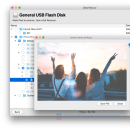Data Rescue 6.0.8
Data Rescue is capable of finding many types of files when performing a Deleted Files Scan or a Deep Scan. Some supported file types are:
Documents: Word, Excel, PowerPoint, PDF
Images: JPEG, PNG, RAW, Photoshop, Illustrator
Audio: MP3, WAV, AIFF, AAC, Ogg
Videos: MPEG-4, QuickTime, AVI, WMV
Archives: Zip, Gzip, RAR, Stuffit
And many more!
In addition to files detected by their content when the file system is corrupted or non-functioning, Data Rescue supports recovering files from the following file systems:
HFS and HFS+ [Mac Only]
FAT (FAT12, FAT16, FAT32) [PC Only]
NTFS [PC Only]
If a file system is unsupported, Data Rescue can still recover files through the deep scan by scanning for known file patterns.
The Quick Scan is the fastest method that detects existing directory structures even if your hard drive does not mount. This scan will detect files with their original folder hierarchies and file names. It is recommended to try this scan method first if your volume is detected on the hard drive.
A Quick Scan can only be used on a volume. If you have selected the hard drive to be scanned, the Quick Scan will attempt to search for the first available volume on the hard drive, then rebuild the directory structure for that volume.
The Quick Scan typically takes a few minutes to complete, but may take up to a few hours to retrieve the results in more severe cases. Bad blocks on the hard drive may slow down the scan process, but will immediately speed up once it has overcome those bad blocks.
Due to Quick Scan’s overall speed, it should be tried first in most cases. Quick Scan should also be chosen if:
The startup disk fails to boot into the OS.When an external drive fails to mount.
Deleted Files Scan utilizes the unused free of a volume for any files based on file patterns. By scanning only the free space it allows the Deleted Files Scan to specifically detect any files that were deleted.
Once files are deleted through the Operating System, there is no more reference to their original directory structure, filename, or date created/modified. Data Rescue® 4 will not be able to detect the original information of that file in the directory structure. Instead, Data Rescue® 4 will rebuild any files that it detects based on its file patterns. The results of the Deleted Files Scan will be provided with generic filenames and organized by category in the Reconstructed Files folder.
Deleted Files Scan can utilize FileIQ for finding additional files.
The Deleted Files Scan usually takes up to three minutes per gigabyte of free space available on the volume. This makes the Deleted Files Scan faster than a Deep Scan since it is not scanning any known used space on the volume.
Deleted Files Scan should be used when your drive is working properly but files were deleted by the operating system, another program, or by you via the Trash.
| Author | Prosoft |
| License | Demo |
| Price | $19.00 |
| Released | 2023-07-31 |
| Downloads | 338 |
| Filesize | 16.90 MB |
| Requirements | Mac OS X 10.12 or later |
| Installation | Instal And Uninstall |
| Keywords | recover drive, datarescue, file recovery, recover, mac recovery, mac |
| Users' rating (78 rating) |
Using Data Rescue Free Download crack, warez, password, serial numbers, torrent, keygen, registration codes,
key generators is illegal and your business could subject you to lawsuits and leave your operating systems without patches.
We do not host any torrent files or links of Data Rescue on rapidshare.com, depositfiles.com, megaupload.com etc.
All Data Rescue download links are direct Data Rescue full download from publisher site or their selected mirrors.
Avoid: oem software, old version, warez, serial, torrent, Data Rescue keygen, crack.
Consider: Data Rescue full version, full download, premium download, licensed copy.






